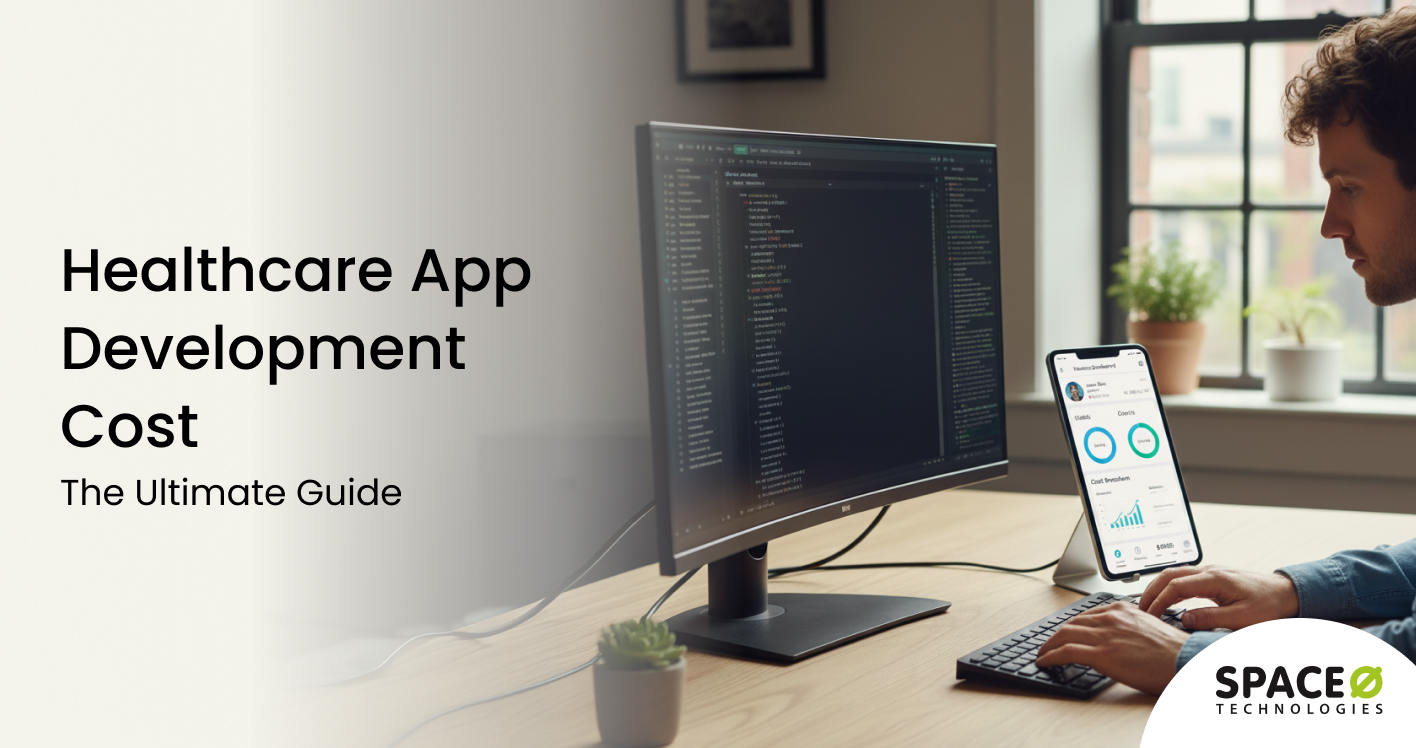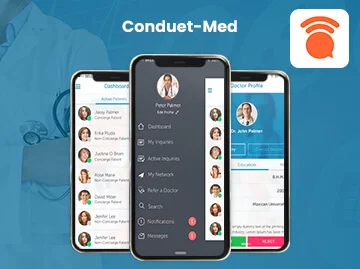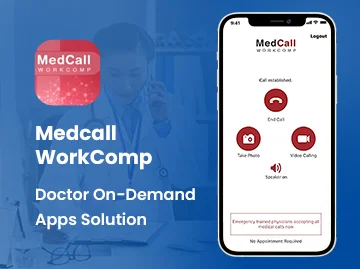Healthcare apps have become a core part of how hospitals, clinics, and digital health startups deliver care in 2025. Whether it is telemedicine, remote patient monitoring, ePrescription, or wellness management, every healthcare business is now exploring digital solutions to serve patients better.
According to Fortune Business Insights, the global mHealth apps market is projected to grow from USD 40.65 billion in 2025 to USD 88.70 billion by 2032. This growth reflects a clear demand for digital health solutions. But before building a new app, the first and most common question decision makers ask is how much it will cost.
This blog offers a detailed healthcare app development cost breakdown based on features, app types, complexity, compliance requirements, and development models. Learn the average cost range, what drives the budget, how to control it, and whether to approach a healthcare app development company or build in-house for better cost efficiency.
Table of Contents
Healthcare App Development Pricing Overview
Typically, healthcare app development costs range from $30,000–$80,000 for a basic MVP to $150,000–$500,000 for more complex, enterprise-grade solutions. Healthcare mobile apps handle sensitive patient data and require a strong architecture and compliance adherence. This fundamental difference drives every cost component, from planning and design to development and post-launch maintenance.
Since these factors make app development costs inherently different for the healthcare industry, it’s helpful to understand what makes healthcare app development truly unique:
- Security Requirements Are Non-Negotiable: Standard apps worry about protecting user preferences and account data. Healthcare apps protect medical records, treatment plans, and personal health information. HIPAA mandates encryption, audit trails, and multi-factor authentication. These aren’t optional nice-to-haves.
- Regulatory Compliance Isn’t Optional: Launching an ordinary mobile app development project? You can iterate quickly and fix problems on the fly. Healthcare app development requires compliance validation upfront. You can’t launch a telemedicine app without proving HIPAA readiness. You can’t sell an app to EU patients without GDPR documentation.
- Testing Takes Significantly Longer: Standard apps need functional and performance testing. Healthcare apps need functional, security, compliance, and usability testing. Each layer adds time and expertise cost. Security penetration testing alone can take 2 to 4 weeks.
- Integration Complexity Is Exponentially Higher: A fitness app syncs with your smartwatch. A patient portal must integrate with multiple hospital systems simultaneously. Each integration uses different data formats, requires custom API development, and demands individual security compliance.
- The Hidden Cost Trap: Most entrepreneurs focus on development costs and miss the real expense structure. Once your healthcare app launches, annual maintenance, compliance audits, security updates, and hosting multiply your investment. Many projects fail not because development was expensive, but because ongoing costs exceeded budgets.
This is why understanding the full picture, development plus hidden costs, is critical before you begin. Now that you understand what drives healthcare app costs, let’s look at realistic pricing for different project types.
Build Your Healthcare App Within Budget
Get a clear cost estimate and a development plan tailored to your goals. Work with Space O Technologies to build secure and scalable healthcare apps without overspending.

Healthcare App Development Cost by Complexity
The cost of your health app development project depends heavily on its complexity level. We’ve categorized healthcare apps into three distinct tiers, each with different timelines, team sizes, and investment requirements.
| App Complexity | Cost Range | Timeline | App Examples |
|---|---|---|---|
| Basic Healthcare App | $30,000 to $80,000 | 3 to 4 months | Wellness tracking app, basic appointment booking app, health tips app, fitness habit tracker |
| Mid-Level Healthcare App | $80,000 to $250,000 | 5 to 8 months | Teleconsultation app, ePrescription app, doctor discovery app, basic patient portal |
| Complex Healthcare App | $250,000 to $500,000+ | 9 to 14+ months | Full telemedicine platform, EHR integrated system, remote patient monitoring app, AI-based diagnostic app |
Now let’s dive deeper into what each tier includes and when to choose it:
Tier 1: Basic healthcare apps — $30,000 to $80,000
Timeline: 3 to 4 months
Perfect for: Testing ideas, securing initial funding, launching proof of concept
When to choose this tier: You’re a startup with a limited budget, want to validate one of your healthcare app ideas, or plan to launch a minimum feature set before raising capital. This is the fastest, most affordable path to launch.
- User registration and basic profiles
- Appointment scheduling or health tracking
- Push notifications and reminders
- Basic HIPAA-compliant security
- Single platform (iOS or Android)
- 2 to 3-person team
This is the sweet spot for startups beginning their healthcare app development journey. You validate market demand without overcommitting capital. Many successful healthcare startups launched this way, then scaled to higher tiers after proving the concept and raising funding.
Tier 2: Mid-level healthcare apps — $80,000 to $250,000
Timeline: 5 to 8 months
Perfect for: Full-featured healthcare solutions ready for real market launch
When to choose this tier: You have secured funding or revenue, need a complete product ready for enterprise clients, or plan to launch a subscription-based healthcare service. This tier covers 80% of the healthcare app market needs.
Core features
- Cross-platform deployment (iOS and Android simultaneously)
- Real-time order/appointment tracking with GPS
- Secure video consultations (basic implementation)
- End-to-end encrypted messaging
- Basic EHR integration or third-party service connections
- Advanced HIPAA compliance architecture
- Analytics and reporting dashboards
- 5 to 7-person development team
This tier represents the majority of healthcare app development company projects. It’s mature enough to be market-ready but still focused and manageable. You’re investing enough to create a professional product that healthcare providers and patients trust, without the enterprise complexity and cost.
Tier 3: Enterprise healthcare apps — $250,000 to $500,000+
Timeline: 9 to 14+ months
Perfect for: Hospital systems, enterprise healthcare platforms, complex clinical workflows
When to choose this tier: You’re an established healthcare organization, have significant funding, need to integrate multiple hospital systems, or want AI-powered diagnostics and advanced features. This tier serves enterprise clients with complex requirements.
Core features
- AI/ML diagnostic capabilities
- Real-time IoT and wearable device integration
- Complex multi-system EHR integration
- Advanced telemedicine infrastructure
- Blockchain for data verification
- Enterprise-grade security and compliance
- 5+ simultaneous third-party system integrations
- 8 to 12+ person specialized team with data scientists
This investment is reserved for organizations building comprehensive healthcare solutions that serve hundreds or thousands of users. The complexity is higher, the timeline is longer, but the result is a fully integrated healthcare ecosystem that can handle enterprise operations. Partnering with top healthcare software development companies is essential at this level to ensure successful delivery.
Now that you’ve identified your tier, let’s look at specific healthcare app types and how they fit into these cost ranges.
Popular Healthcare App Types and Their Development Costs
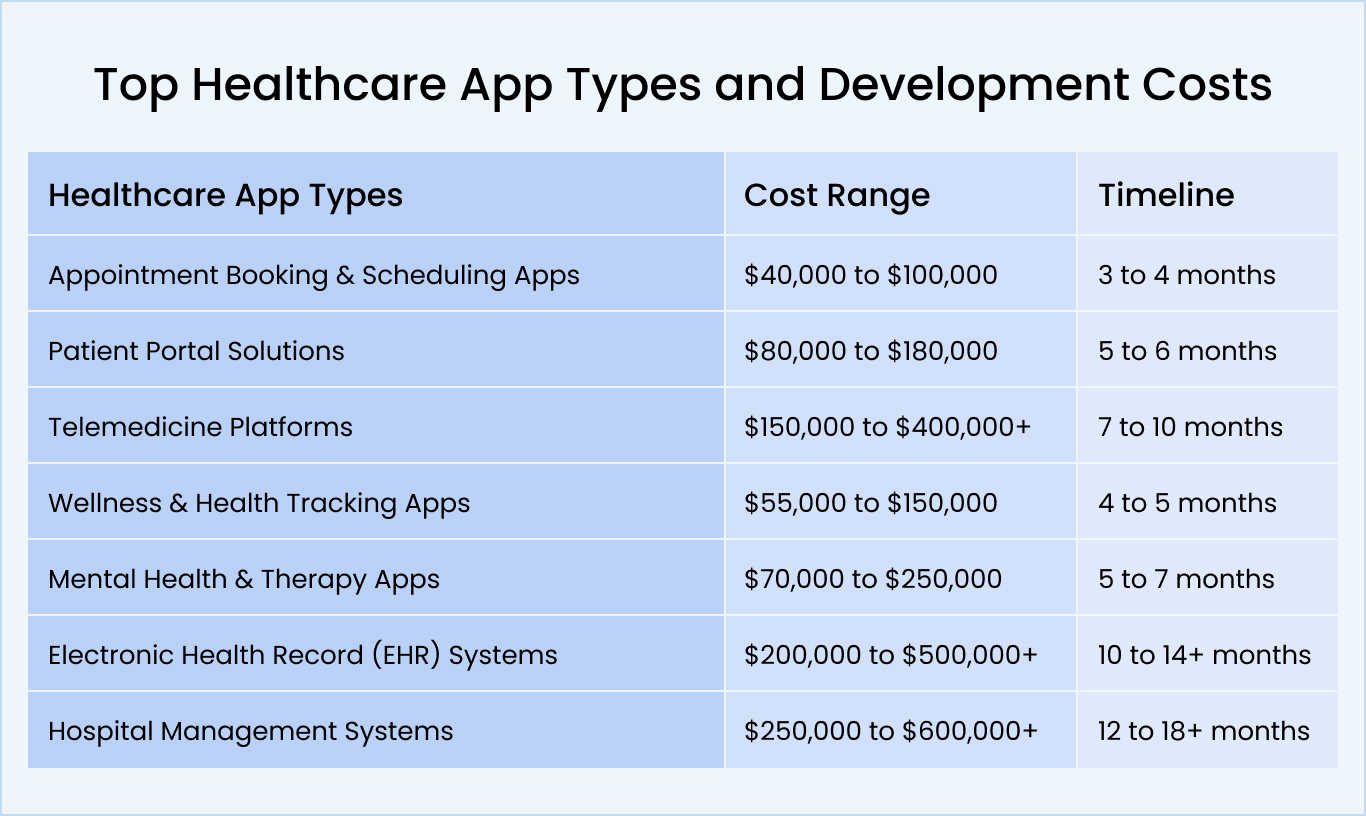
Understanding what you’re building directly determines your budget. Let’s examine the most common healthcare application development categories and realistic costs. Each app type has unique technical requirements, compliance considerations, and integration complexity that impact your final investment.
1. Appointment booking & scheduling apps — $40,000 to $100,000
Appointment booking apps are the simplest healthcare app development projects available. These applications let users search for available appointments, book them instantly, and receive automated confirmations and reminders.
With minimal backend complexity and straightforward user workflows, appointment booking apps are the perfect entry point for healthcare app development services and startups validating market demand.
What’s included: Calendar synchronization, notification system, patient profiles, basic HIPAA encryption
2. Patient portal solutions — $80,000 to $180,000
Patient portals represent a significant step up in healthcare mobile app development complexity. These solutions give patients secure access to their medical records, allow them to request prescriptions, view test results, and schedule appointments all through a single protected interface.
Patient portals require robust backend infrastructure and advanced security measures because they handle sensitive health information and must integrate with existing healthcare provider systems.
Key cost drivers: EHR system integration, role-based access controls, secure data transmission, HIPAA compliance infrastructure
What’s included: Secure data storage, encrypted communications, audit trails, multi-factor authentication
3. Telemedicine platforms — $150,000 to $400,000+
Telemedicine platforms represent real-time healthcare app development at scale. Providers and patients connect via video consultations, exchange digital prescriptions, and schedule follow-up appointments all through a single secure interface.
This is where complexity escalates dramatically because you’re managing real-time communication, payment processing, and healthcare compliance simultaneously across multiple user types and touchpoints.
Key cost drivers: Video infrastructure, prescription verification system, payment processing, real-time communication protocols, healthcare compliance across multiple touchpoints
What’s included: HD video SDK integration, secure appointment scheduling, digital prescription management, HIPAA-compliant data transmission
4. Wellness & health tracking apps — $55,000 to $150,000
Wellness and health tracking apps focus on personal health management and preventive care. Users log their daily activities, track fitness metrics, sync data with wearable devices, and receive personalized health insights based on their behavior.
While these apps carry less regulatory burden than clinical healthcare apps, wearable device integration adds technical complexity and requires sophisticated real-time data synchronization.
Key cost drivers: Wearable API integrations, real-time data synchronization, analytics engine, and user engagement features
What’s included: Multi-wearable connectivity, data visualization dashboards, push notification system, cloud-based storage
5. Mental health & therapy apps — $70,000 to $250,000
Mental health and therapy apps provide specialized healthcare app development focused on connecting patients with licensed mental health practitioners. These platforms handle therapist-patient matching, secure video sessions, clinical documentation, and progress tracking, all while maintaining strict patient confidentiality.
Mental health data is particularly sensitive, requiring additional encryption and HIPAA compliance considerations beyond standard healthcare apps.
Key cost drivers: Matching algorithm, end-to-end video encryption, clinical note system, HIPAA compliance for sensitive mental health data
What’s included: Therapist verification system, encrypted communications, session management, mood tracking, progress analytics
6. Electronic health record (EHR) systems — $200,000 to $500,000+
Electronic Health Record systems represent the most complex category of healthcare application development. These enterprise systems manage clinical workflows, patient data, and operations across entire healthcare organizations.
EHR systems must integrate with labs, pharmacies, insurance systems, and other medical devices while maintaining comprehensive audit trails and compliance across multiple jurisdictions and regulatory frameworks.
Key cost drivers: Multi-department workflow integration, lab and pharmacy system connections, insurance claim processing, extensive customization, enterprise security
What’s included: Clinical documentation system, lab result integration, prescription management, patient history, and role-based access for different staff types
7. Hospital management systems — $250,000 to $600,000+
Hospital management systems represent full enterprise healthcare app development covering the entire hospital operations. These comprehensive platforms manage patient admissions, bed allocation, staff scheduling, pharmaceutical inventory, billing, and revenue cycle management through integrated systems.
Hospital management systems demand extreme scalability, real-time concurrent user management, and seamless integration with dozens of specialized hospital systems and departments.
Key cost drivers: Multi-department integration, real-time concurrent user management, inventory tracking, billing system connections, and extreme scalability requirements
What’s included: Patient admission workflows, bed management, staff scheduling, pharmaceutical inventory, billing, and revenue cycle management
Now that you’ve identified your app type, let’s understand the six factors that drive healthcare app development cost to build an accurate budget and avoid surprises.
Get a Transparent Estimate for Your Healthcare App
No surprises or hidden charges. Receive a detailed cost breakdown with realistic timelines and a development roadmap from healthcare app experts.
The 6 Factors Driving Healthcare App Development Costs
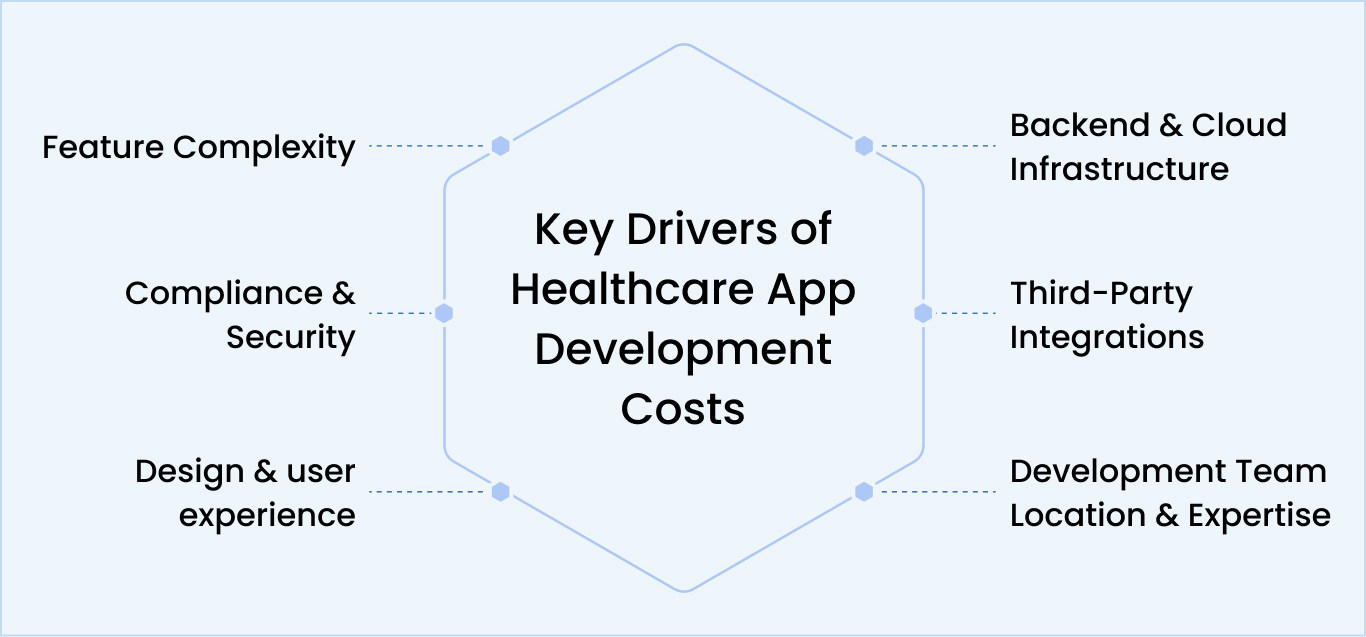
Understanding what drives healthcare mobile app development pricing helps you predict your project’s true cost with accuracy. These six factors account for 90% of cost variation across all healthcare app projects.
By examining each factor, you’ll understand exactly where your healthcare app development cost comes from and where you can optimize without compromising quality or compliance.
1. Feature complexity (30 to 40% of total cost)
Every healthcare feature requires rigorous security testing and compliance validation. Unlike standard apps, where features scale linearly, healthcare features multiply in complexity because each one must integrate with security protocols and regulatory requirements.
A simple login feature takes 1 week to develop. A secure video consultation module takes 4 to 6 weeks because developers must build encryption, real-time communication, and healthcare compliance checks simultaneously. This exponential growth is why feature complexity drives 30 to 40% of your total cost.
2. Regulatory compliance & security (15 to 30% of total cost)
Healthcare data directly affects patient health, making compliance non-negotiable. Building security from day one into your architecture costs 15 to 30% of your project budget. Attempting to retrofit compliance after launch multiplies this cost by 10x because you must rewrite entire systems.
Healthcare apps aren’t just storing user preferences. They’re storing medical diagnoses, treatment plans, and personal health information. One security breach doesn’t just expose data. It exposes sensitive health information that could harm patients and destroy your company’s reputation.
3. Design & user experience (15 to 20% of total cost)
Healthcare users aren’t a homogeneous group. Your app serves elderly patients with limited tech skills, busy clinicians under time pressure making critical decisions, and tech-savvy younger patients. Good design works for all of them. Poor design creates confusion that leads to user errors and low adoption.
Good design in mobile app development for healthcare isn’t about aesthetics. It’s about preventing mistakes. A confusing appointment interface might prevent a patient from booking life-saving care. Difficult navigation in a patient portal might cause patients to miss important health information.
4. Backend & cloud infrastructure (20 to 30% of total cost)
Your backend handles the reliability and scalability that determine whether your app works when thousands of patients need it simultaneously. A weak backend crashes at peak usage. A strong backend scales automatically without crashes or manual intervention.
In healthcare, backend failure isn’t just a technical inconvenience. If your telemedicine app crashes during a consultation, a patient misses their medical appointment. If your patient monitoring app loses data, a doctor might miss critical health information.
5. Third-party integrations (15 to 25% of total cost)
Healthcare apps rarely work in isolation. Your telemedicine app needs payment processing (Stripe), video infrastructure (Zoom), pharmacy connections (pharmacy APIs), and insurance verification (insurance systems). Each integration is separate work requiring different expertise.
Each integration is a potential failure point. Data from system A must transform into system B’s format. System C must receive real-time updates from systems A and B. Each connection requires rigorous testing because patient data moves across systems.
6. Development team location & expertise (20 to 40% of total cost)
Where your team is located affects cost, speed, communication style, and quality control. US teams offer direct communication and immediate issue resolution, but cost 5 to 10x more per hour. App development outsourcing costs are lower but require careful project management and clear specifications.
The tradeoff isn’t just about cost. An offshore team that misunderstands healthcare requirements builds the wrong thing. A US team might be expensive, but it catches healthcare compliance issues before they become expensive problems. The best choice depends on your project maturity and budget constraints.
Development costs are just the foundation. The real financial challenge emerges after your app launches, when ongoing expenses for hosting, compliance, security, and maintenance demand sustained investment that many founders don’t anticipate.
Hidden Costs and Ongoing Healthcare App Development Costs
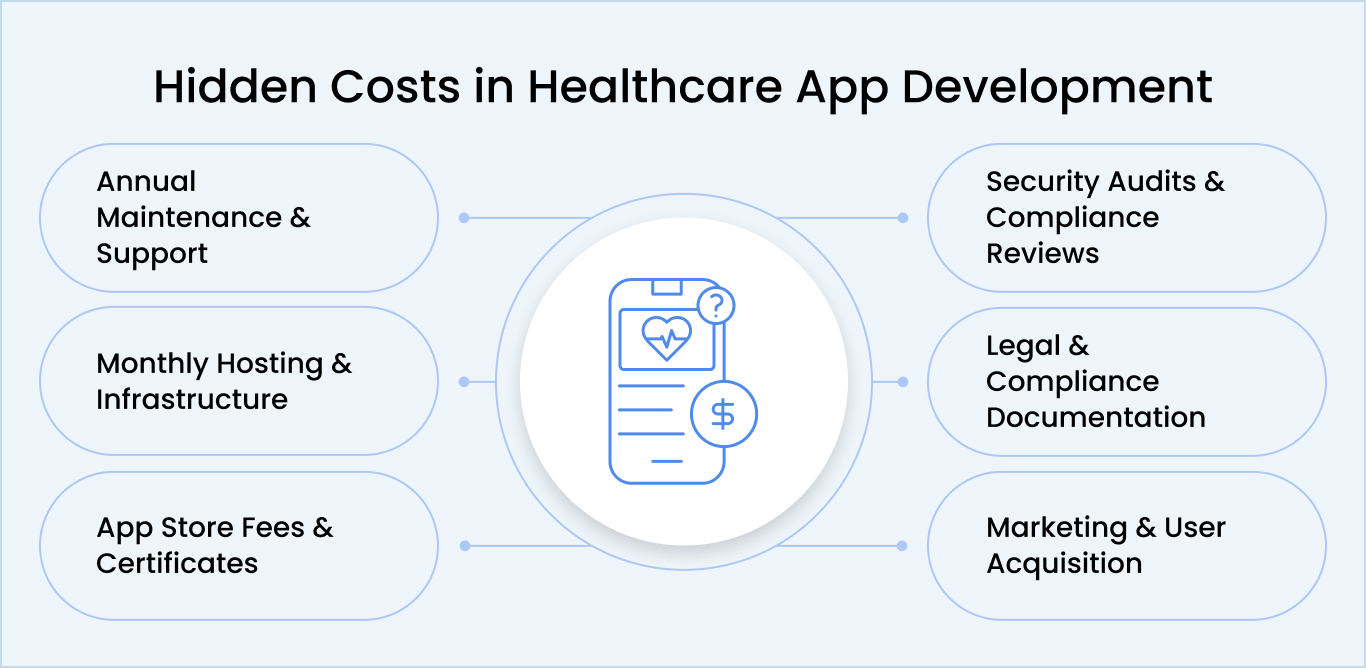
Healthcare mobile applications require continuous monitoring, compliance updates, security enhancements, and regular feature improvements. These ongoing expenses are easy to overlook during initial planning, but they play a major role in the total cost of ownership.
Here are the most common hidden costs involved in healthcare mobile app development
1. Annual maintenance & support
Average cost: $22,500-$37,500/year (15-25% of initial development cost)
Your app requires continuous updates to address bugs discovered by users, security vulnerabilities that emerge over time, and compatibility with new iOS and Android releases. As your user base grows, performance optimization ensures the app remains responsive.
While app maintenance costs may seem high, continuous support keeps your healthcare app stable, secure, and functional throughout the year.
2. Monthly hosting & infrastructure
Actual cost: $100-$5,000/month (varies by app complexity and scale)
Healthcare apps need reliable cloud infrastructure to handle patient data, support real-time features like video consultations, and maintain uptime during critical care scenarios. Your hosting costs scale with user growth, traffic volume, and data storage requirements.
Whether you choose managed cloud services or self-hosted solutions, infrastructure becomes your largest recurring expense.
3. App store fees & certificates
Actual cost: $150-$500/year (minimal but non-negotiable)
Publishing your app on Apple’s App Store and Google Play requires active developer accounts, which demand annual renewal fees. SSL certificates ensure secure data transmission between users and your servers, and these certificates need renewal every 1–2 years.
While individually small, these recurring fees are essential to maintaining your app’s presence and security.
4. Security audits & compliance reviews
Actual cost: $5,000-$20,000/year (essential for healthcare apps)
Healthcare apps handle sensitive patient data, making security audits non-negotiable. Penetration testing identifies vulnerabilities before attackers exploit them, while HIPAA compliance audits ensure you meet regulatory requirements.
These annual assessments protect patient privacy, reduce breach risk, and demonstrate to healthcare partners that your platform is trustworthy and compliant.
5. Legal & compliance documentation
Actual cost: $1,000-$5,000/year (after initial $3,000-$10,000 setup)
Healthcare regulations evolve constantly, requiring your privacy policies, Business Associate Agreements, and compliance documentation to be updated regularly. Beyond your initial legal setup, ongoing legal review ensures your app stays compliant as new regulations emerge.
This protects your organization from liability and demonstrates commitment to patient privacy standards.
6. Marketing & user acquisition
Actual cost: $500-$3,000/month (after initial $5,000-$20,000 launch campaign)
Building a great healthcare app means nothing if patients and providers can’t find it. App Store Optimization, paid advertising, and user acquisition campaigns drive downloads and engagement, yet many founders treat marketing as optional.
Without sustained user acquisition efforts, even the best healthcare app fails to reach the critical mass needed for revenue and impact.
These costs are real, but they’re not inevitable. The organizations that build sustainable, profitable healthcare apps make deliberate choices early, choosing the right team, starting with an MVP, and planning infrastructure strategically. Small decisions compound into significant savings.
Build Secure and Scalable Healthcare Apps at the Right Cost
Partner with Space O Technologies to create HIPAA-ready, high-performance healthcare solutions designed to fit your budget and growth plan.
Smart Ways to Lower Healthcare App Development Costs
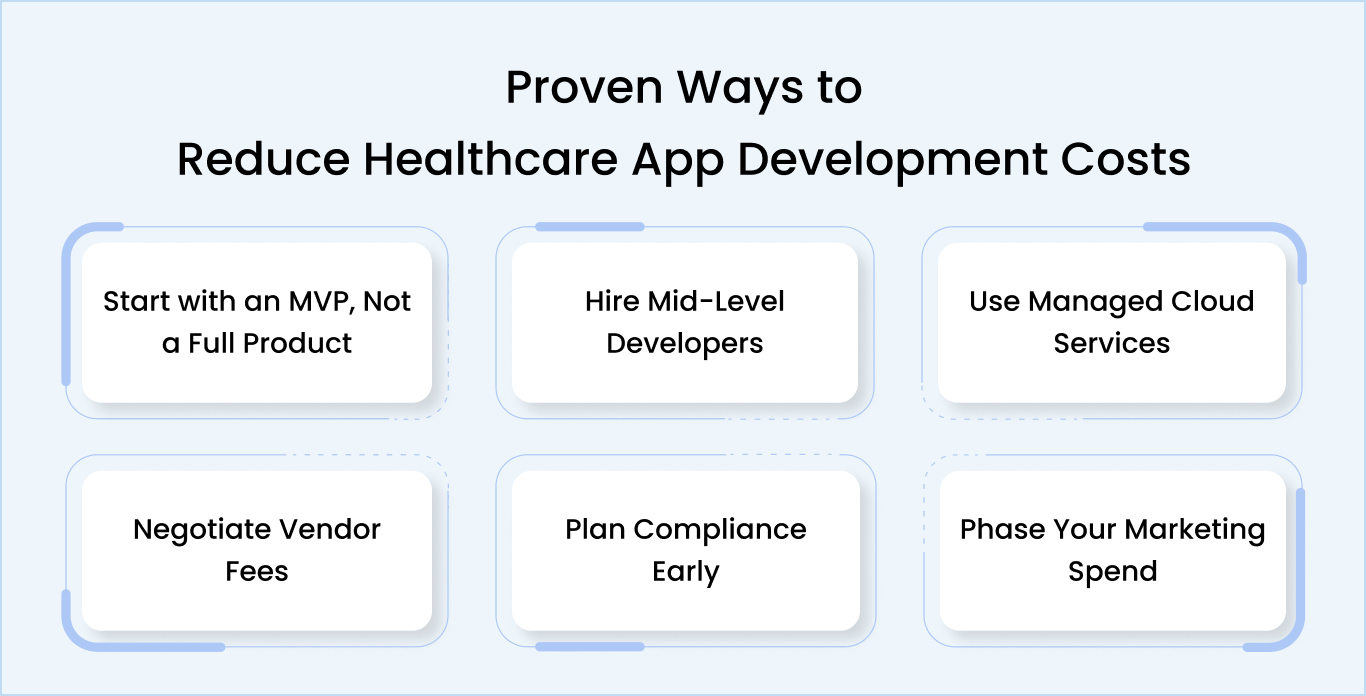
The difference between a healthcare app that drains your budget and one that becomes profitable often comes down to smart planning and strategic choices. Here’s how to reduce costs without sacrificing quality or compliance.
1. Start with an MVP, not a full product
Launch with essential features only: patient registration, basic search, and appointment booking. Add advanced features like AI recommendations, telemedicine integration, and analytics after validating your business model. Healthcare MVP development reduces initial costs by 40-50% while proving market demand.
2. Hire mid-level developers
The cost to hire app developers depends largely on the developer’s experience. Mid-level developers with healthcare experience deliver dependable code, require less oversight, and cost significantly less than senior specialists. In most cases, a balanced team of 5–6 developers is more than enough to build a high-quality healthcare application without inflating your budget.
3. Use managed cloud services
Platforms like AWS, Azure, and Google Cloud handle scalability, security, backups, and uptime for you. While self-hosting may seem cheaper initially, it requires ongoing DevOps support and becomes difficult and expensive to maintain as your app grows. Managed services cost more upfront but save you from costly infrastructure failures later.
4. Negotiate vendor fees
App store developer fees are fixed, but many other services are flexible. Hosting providers, payment processors, and third-party API vendors often offer discounts or custom pricing if you commit to higher usage tiers or multi-year contracts. Negotiation can significantly reduce long-term operational costs.
5. Plan compliance early
HIPAA, GDPR, and other regulations should be built into your architecture early. Retrofitting compliance later results in expensive rework, delayed go-live timelines, and potentially severe penalties. A security-first development approach minimizes risk and prevents unexpected costs.
6. Phase your marketing spend
Don’t burn $20,000 on user acquisition before confirming that your app works well and users actually want it. Start lean with around $5,000 in targeted campaigns, analyze results, refine your positioning, and scale only when you hit positive traction. This protects your cash flow and ensures effective ROI.
Develop Cost-Efficient Healthcare Solutions With Space-O Technologies
Healthcare app development requires smart financial decisions early on. Organizations that succeed don’t spend less; they spend smarter by prioritizing features strategically and choosing infrastructure carefully from day one. That’s exactly where experienced healthcare development partners make the difference.
With 15+ years of experience, Space-O Technologies is an expert healthcare app development agency for building your healthcare solution. Our 140+ developers have built solutions that serve hundreds of thousands of patients daily, proving we know how to turn complex healthcare requirements into profitable applications.
Our healthcare track record is unmatched: zero data breaches, 98% client satisfaction, and consistent delivery of HIPAA-compliant solutions on budget and on time. We don’t just build apps, we engineer sustainable healthcare platforms that drive revenue, improve outcomes, and scale reliably from launch through growth.
Explore our portfolio to see how we’ve transformed healthcare operations for telemedicine platforms, clinical systems, and patient engagement solutions.
Ready to build your healthcare app with a partner who understands both medicine and budgets? Schedule a free consultation today to discuss your vision and receive a realistic cost breakdown.
Frequently Asked Questions About Healthcare App Development
How much does a simple healthcare app cost?
A simple healthcare MVP typically costs $30,000 to $60,000 and takes around 2–3 months to build. This covers essentials like user registration, patient profiles, appointment booking, and push notifications. It’s ideal for validating your idea and raising early investment. Advanced features or multi-platform builds will increase the cost.
Do healthcare apps need separate iOS and Android versions?
Not initially. Most healthcare apps, especially MVPs, work perfectly with cross-platform development using Flutter or React Native. This gives you 90–95% shared code and cuts development costs by 25–35%, without compromising core features like authentication, patient profiles, scheduling, or EHR data viewing.
You only need fully native iOS and Android versions later if your healthcare product requires advanced device integrations, HIPAA-grade offline storage, or specialized high-performance modules.
How can I reduce healthcare software development costs without hurting quality?
Start with an MVP, choose cross-platform development, use managed cloud services, reuse proven healthcare components, and avoid custom features your users don’t need yet. Smart planning saves 30–40% without cutting corners.
How long does healthcare app development typically take?
Development timelines depend on complexity. Basic MVPs take 3 to 4 months, mid-level healthcare apps require 5 to 8 months, and enterprise systems need 9 to 14+ months. These timelines include extended testing for security and compliance, something standard apps don’t require. You can’t compress timelines without cutting corners on compliance, which creates legal liability later. Plan for longer timelines when building healthcare applications.
Should I hire developers or outsource my healthcare app development?
This depends on your project stage and budget. Outsourcing to an experienced healthcare development company reduces upfront hiring costs and accelerates time-to-market. Hiring in-house gives you more control but requires recruiting, onboarding, and managing a permanent team.
Most startups outsource their first app to validate the market, then build in-house teams for subsequent products. Choose based on whether you prioritize speed (outsource) or control (hire).
